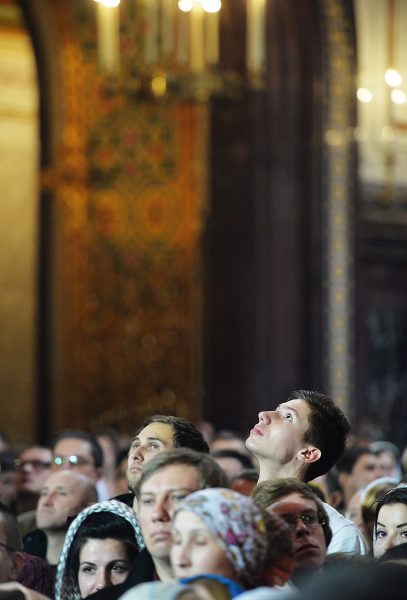“What must I do to be saved?” This is a natural question when we reach the stage of our spiritual journey at which we begin to realize that something is wrong, something is wrong between me and God. It is a natural question, but it is the wrong question, at least according to Archimandrite Aimilianos of Simonopetra (monastery on Mt. Athos). Archimandrite Aimilianos says the following in a lecture called “The Progression of the Soul” that has been transcribed and translated into English and can be found in the book, The Way of the Spirit: Reflections on the Life in God.
“Thus the first element we need in order to embark on our path is the feeling of exile”

Archimandrite Aimilianos of Simonopetra
Archimandrite Aimilianos concedes a little later that words like “feeling” are inaccurate and perhaps misleading because they are words that we usually use to describe a huge range of passions and sensations: I feel hungry, I feel sad, I feel a pebble in my shoe. However, he is intentional in using such words as “feeling” because he wants to emphasize the actual experience of the spiritual life as opposed to a metaphysical or philosophical speculation about the spiritual life. He likens the spiritual journey to a walk to the corner store. You know what you will encounter along the way to the store because you have actually experienced it before: you have seen, heard, smelled and felt it. Archimandrite Aimilianos says that it is the same way on the spiritual journey except you don’t experience it with physical senses, but you experience it inwardly. And because one does indeed experience the spiritual life, “feeling” is an adequate word to use to begin to describe the experiences of the spiritual life.
And this initial experience, or at least the one that gets us moving with intention on the spiritual journey, this “first element” as Archimandrite Aimilianos calls it, is the feeling of exile, this feeling that all is not right between me and God, that there is somehow a barrier, a wall between me and God.
“Before us now is the shaken soul, the cast-away soul, closed in by four walls and unable to see a thing. This same soul, however, is thinking about breaching the barrier, about breaking down the walls within which it has come to live, and to live instead with God. How must it proceed?”
Archimandrite Aimilianos asks the question using the word “must,” and then he immediately makes the following statement:
“Here we need to know that, contrary to our expectations there is no “must.” Such a word does not exist within the Christian life. The idea that something “must” be, or “must” take place, is a product of the intellect; it is something that I arrive at as a logical conclusion, a deduction based on something in the Gospels, or which Christ taught in his parables, or with respect to His ethical teachings to do this or that. But the word “must” has never moved anyone to do anything. On the contrary, it makes you feel like a slave and discourages you from moving forward. The force of “must” moves neither God, nor the [human] heart. It pertains only to the logic of human deliberation, to the endurance of human determination, which as we all know is something that unravels and comes apart very easily.”
Because “must” is a product of human deliberation and determination, it can never work in the spiritual realm because the human heart is so weak. What I am convinced of today and determined with all of my heart to do can change in a moment. New information, different circumstances, changing relationships, all this and more effect our hearts and minds. Archimandrite Aimilianos puts it this way:
“The most fragile thing in the world is the human heart, along with all of its deliberations and determinations. The things about you that I love, I may later come to hate. And the things about you that I now hate may later cause me to fall in love with you. I may condemn you, and on the same grounds proclaim that you’re the best person in the world. I can exalt you to the skies, and at the same time wish you were in hell. I may decide to become a saint, and at the very moment become a devil.”
Now I realize that some of my readers may not be aware that their heart is this fickle. Some of you may be saying to yourselves, “Well, I know of some other people who are that fickle, who don’t stick to their commitments, who lack the inner strength or will power to determine what must be done and to stick to it. But I am not like that.” For those who are thinking this thought let me tell you something that my spiritual father once told me. He said that every sin I see in others I am able to see because the same sin exists in me. I may not express the sin in the same way, I may not have had, as the detectives on TV say, the same “means, motive and opportunity” as others to commit in bolder, more external ways the sins that also ensnare my heart. But the sins are nonetheless there, and if I am willing to ask God to show me the sins in my heart, in this case the fickleness of my heart, mind and will, God will likely be gracious enough to show me. The hymns of the Church teach us that it is a spiritually dangerous thing to say along with the Pharisee, “I am not like other men” (Luke 18:11).
But for Archimandrite Aimilianos, fickleness or changeability are characteristics of every human heart and mind which is why, for him, words such as “must” do not exist in Christian life. Whatever I determine based on my understanding about the ways or principles or “laws” of the spiritual life cannot be applied in any categorical way. Not to myself, and not to others. This does not mean that we do not discover principles or laws or guidelines for the spiritual life, nor that these cannot be shared with others. What it means is that they cannot be applied, either to myself or to others, as constraints, as “musts” that bind or enslave us. When one attempts to make progress in the spiritual life constrained by “musts,” according to Archimandrite Aimilianos, “it makes you feel like a slave and discourages you from moving forward.”
So if there is no “must” in the Christian life, then what do we have? How do we teach and guide one another along the spiritual path? Well I think Archimandrite Aimilianos would say, first, very humbly, carefully and based on our own actual experience. To use his metaphor, it is like giving directions to the corner market. If I myself have never been to that market, then certainly, I had best keep my mouth shut about how to get there—even if I have studied all the maps. And if I feel I must speak, then I need to speak carefully, tentatively, realizing that much of what a person actually experiences along the journey will not be communicated by any map. And even if I have made that journey myself a hundred times, great care is called for in giving the directions, for what is to me an obvious landmark along the way may be completely missed by someone else walking that exact same path. Guiding someone along the way of their spiritual path to God is very similar. The landmarks of my experience with God that stand out in my mind as most significant, may not be exactly the same landmarks that another encounters or finds significant.
It has happened to me several times in the context of a conversation with my spiritual father or some other wise person or in reading a book by a spiritual writer that I have had the “aha” moment when I realized that I have indeed had a certain inner experience that at the time I did not consider significant. But when I hear or read someone else talk about the significance of what seems to be the same experience in his or her journey, then I begin to reflect on my own experience and begin to realize that there was indeed much more significance in that experience than I had previously realized. I just didn’t see it, or notice its importance at the time. Like walking to the corner store, even if everyone walks exactly the same route, everyone is likely to notice different landmarks and appreciate different sights and smells and sounds along the way. This is why “must” is such a dangerous word in our spiritual vocabulary.
I’d like to end today by pointing out that “must” can be communicated in many forms without actually saying the word “must.” Generally speaking, the word “should,” especially in the context of spiritual guidance, carries the same force as “must,” “have to,” or “ought.” It has become a kind of red flag for me, this word “should.” As soon as I hear the words “you should” forming in my mind, either to myself or to others, I take it as a sign that I have probably stopped having any real spiritual insight or helpful guidance, and I am probably just relying on my own rational analysis, my own deductions and conclusions. When I start to hear the word “should” in my mind, I like to say to myself, “Speaking of “should,” you should probably shut up now. Shut up and pray.”
I don’t always. In fact, I don’t shut up nearly as often or as quickly as I would like. Sometimes rational analysis is all I have, or all I seem to have. And when that’s the case and the circumstances are such that I feel compelled to say something, then I try my best to couch my words in as much freedom as possible. I don’t want my spiritual child or whoever it is who comes to me for advice to feel trapped, to feel enslaved, to feel as though they must do what I tell them; because if they do feel trapped and enslaved, then, according to Archimandrite Aimilianos, they will not move forward, they will remain stuck where they are. Progress in the spiritual life, in the Christian life with God, is made only in freedom, only as we learn “to act and move forward on the basis of…a kind of vision, that is, on the basis of [the soul’s] inner perception and feeling for things.” When we act this way, there are no “musts.” There are only land marks noted by those who have gone before and bits of advice from seasoned travellers, those whom we call our spiritual fathers and mothers.

















